
|
|
In Memory's Eye
(Part 7) To one and all she was Flora, and will forever remain so in this telling. Later generations will talk of the Honourable Flora MacDonald, and recount in detail her many accomplishments, pre-politics, in politics, post-politics. On Parliament Hill she was the stuff of legend, of memory, of admiration. Tall, graceful, blue eyed, red haired, she carried with her the aura of her Scottish ancestry. As she strode through the corridors and the tunnels on Parliament Hill it seemed as though she was heading a retinue of court retainers. They were staffers or colleagues, but in her wake they seemed to be devoted subjects. It was not hard to picture the Scottish heroine shepherding her fleeing monarch to the boat waiting to "carry him safely o'er the sea to Skye". Returning to reality, the Honourable Member for Kingston and the Islands was the repository of more secrets generated in the toss and tumble of Tory Party infighting than one-time guru Dalton Camp. She had been a tireless worker in the party's office for years before entering politics. Her very existence, the things she knew, pre- and post-Diefenbaker, placed her apart. Flora knew, but Flora never told. Should she pen her memoirs, tell of intrigues and battles long ago, they would be acclaimed far beyond her publisher's expectations. That she has not done so may be a relief to some, but Canadians at large would benefit greatly from her story told in the first person. "I was there" might well preface any and every untold tale. Again, strictly from the neutral and non-partisan view of Hansard staff, she was a parliamentarian of stature, well spoken, and respectful of the traditions, rules, and customs of the House. Clear and articulate, as member and as Minister of the Crown, she held fast to her lifelong political convictions. On a number of occasions she engaged in royal verbal combat with opponents, and inflicted scars as befitted a red-headed, aroused, and fiery Scot. In person she was kind and forgiving. We enjoyed her visits to the environs of Hansard. She always had time to listen and encourage. She was a bonny fechter and an outstanding ambassador for all manner of people, places, and things Canadian. Her country awaits her own full story. It was the 1960s, during the greatest women's emancipation movement in history, with its flower children, pot smoking, bra burning, placard waving, "women on the march" campaigners claiming co-equal rights with men, and she was the only woman in the House of Commons. In retrospect it still shocks the social conscience of Canadians. From 1965 to 1969 the Honourable Member for Burnaby, Grace MacInnis, was the lone female member of the House of Commons. For that one fact her story is unique, but compared with her whole life's work, in the home, in public, and in her retirement years, it was just a four-year segment that she endured, an example to the excluded ones, the sacrificial female candidates who were recruited by the political parties of the time to run in impossible to win ridings dotting the electoral map of Canada. It is difficult to understand how it happened that only one woman occupied a seat in the House of Commons forty odd years ago. Odder still is how she is neglected in institutional memory. There is a bust of Agnes MacPhail, the first woman ever to be a Canadian Member of Parliament, to be seen in the Speakers Corridor, a part of the Centre Block not usually open to the visiting public. Its placement there may have been well intended, but it only served to strengthen the impression that women should not be seen in Parliament, save in person in the Ladies Gallery, and certainly should not be heard. By herself Grace MacInnis forcefully demonstrated that women should be heard, even if hers should be but a single voice in the 264-seat Green Chamber. She bore impressive credentials. The daughter of J.S Woodsworth, founder member of the CCF (Co-operative Commonwealth Federation), later to become the NDP (New Democratic Party), she wed Angus MacInnis, 24 years her senior, who was a tireless advocate for the downtrodden and all who laboured in poverty under terrible working conditions. Angus in time ran for Parliament himself, and was the representative for Vancouver South for many years. Grace was a perfect partner. Despite many years of suffering with arthritis, she travelled the country, organising, lecturing, and pleading the cause of women and other disadvantaged groups. She shared her husband's political philosophy and supported him in every way she could. After the death of her husband she took it upon herself to run for election to the federal Parliament, won in the riding of Vancouver Kingsway, took possession of his former office on the sixth floor of the Centre Block, and from there on made her own name, in her own right, as the voice of Canada's women and the socially deprived. It would have been easy for her to fall victim to the shrill stridency of her unelected sisters and attempt to browbeat all those males viewed as the oppressors of women who sat in Parliament. True, she lectured them, but without hectoring, and won their attention and respect. A resurgence of interest in the woman and her career is evidenced in the number of Internet sites where her name appears. There are books and pamphlets detailing her work. More will follow. Why "Auntie Grace"? When my colleagues discovered that she was actually an aunt of my wife they immediately adopted her as one of the Hansard family. Staff survivors, no doubt, have their own memories, but "Auntie Grace" she was, and "Auntie Grace" she will remain until the last one leaves to join both her and her beloved Angus.
But the times were a-changing. First came Christine Keeler and Mandy Rice Davis popping into the limelight in Britain. Canada was soon to enter the spotlight with Gerda Munsinger. The man who broke the Canadian story did so spectacularly and openly on the floor of the House of Commons. Lucien Cardin was an unlikely figure to turn the spotlight on a sexual liaison between a former Cabinet minister and a German temptress. A barrister, he was first elected to the House of Commons in 1952, and served as a loyal Québec member of the Liberal Caucus for ten years before being nominated Minister of Justice by Prime Minister Pearson. In that post he maintained a relatively low profile. It was at a time when Diefenbaker, the ousted Prime Minister who likened himself to a big game hunter, regularly turned his sights on fallible Liberal Ministers from Québec, with remarkable success. It was said that he had one for breakfast each morning, a veritable Hannibal Lecter in his time. Cardin seethed as he saw his colleagues cut down, seemingly undefended by Pearson, his leader. Conservatives were the purest of the pure, cabinet ministers from Québec the vilest of the vile. Finally came the day that Cardin was unable to stand the constant taunting from Diefenbaker, and using the only resort available to him shot back: "What about the Monseignor affair?" As it happened, Diefenbaker was momentarily puzzled by the reference, and he was not the only one. As it happened, the Hansard reporter was also puzzled. Fortunately the luncheon recess was called and Mr. Cardin could be asked to supply the correct spelling of the name he had called out. Unfortunately, Mr. Cardin hied himself hotfoot to his office, locked the door, and made himself unavailable for questioning. By this time members of the Press Gallery sensed something important was involved, and urgently queried the Hansard staff. What exactly was the name? How was it spelled? Being the reporter involved I tried Mr. Cardin's office door myself. Nothing. Not a sound. Despite misgivings, the Editor of Debates went with the onomatopoeic spelling, and that was how it appeared in that day's Hansard. By next day the Press had uncovered the secret. The name was Munsinger, Gerda Munsinger. Even Mr. Cardin himself had not known it correctly. The ex-cabinet minister principally involved had been a member of Mr. Diefenbaker's own government. The story and subsequent revelations ran for days. One upshot of the whole affair was a change in Diefenbaker's breakfast diet. The quiet, unassuming Lucien Cardin had stopped him cold with just one word, "Monseignor". Had some long dead Member returned in ectoplasm to address once more the Chamber of which he had been an adornment when still in bodily form? An intrepid constable decided to investigate. What he found was the newly elected Member for Brome-Missisquoi on his feet addressing the empty Chamber, the empty Speaker's Chair, the empty Press Gallery, the empty Ladies Gallery, Diplomatic Gallery, Officials Gallery, and Public Gallery. Surrounded by empty space, the Hon. Member spoke with passion, and as he spoke he cast his eyes across at the empty government benches, at his own colleagues' empty benches, upwards at the Press Gallery, and at the vacant Speaker's Chair, his eloquence matched with gestures that alone spoke volumes. Heward Grafftey took his role as a Member of Parliament seriously. If his electors had chosen him as their representative, he was determined to represent them well, and if that meant practising his oratorical talents in an empty House of Commons, so be it. His was a remarkable career in public life. For many years he was the sole Anglo representative of the Progressive Conservative Party from Québec. Earnestness marked his every utterance. He believed in his party's policies, and manfully soldiered on through many years as a member of Her Majesty's Loyal Opposition. He was first elected a Member of Parliament in 1958, but did not achieve ministerial rank until June 1979 in the short-lived Clark government. Unhappily he did not enjoy sitting in Cabinet for very long as that government went down to defeat just nine months. Twenty-two years later, in 2002, when the leadership of his party fell vacant, Heward Grafftey, an arisen phoenix in his seventies, was the first person to announce himself a candidate for the position, once again demonstrating his belief in his party, and his wish to see it return to its former glory. Heward Grafftey is one of a select few to reject appointment to the unelected Senate of Canada. After winning seven sucessive General Elections he was offered that golden prize of patronage so eagerly grasped by so many. "I would draw welfare rather than sit or sleep in the Red Chamber," he declared. The story is a simple one. When Liberal Prime Minister Trudeau, who occupied office for sixteen years, learned that a Conservative in a vulnerable constituency might be amenable to becoming a Senator, thus opening his Commons seat to a possible Liberal win in a by-election, he was willing to take the gamble. In his book Why Canadians Get the Politicians & Governments They Don't Want, published in 1991 by Stoddard Publishing Co Limited, Toronto, Grafftey relates such an incident:
Whatever may be recorded of his career in future times, that one declaration by Heward Grafftey merits remembrance by his fellow Canadians. Piety and politics are an unusual combination in any parliament. True, religion and politics are frequently combined in legislatures all over the world. Ordained ministers and clerics have risen to prominent positions in the political realm, but the opposite path has not often been taken by politicians. One who took that path was at one time the youngest Canadian to win a General Election and take a seat in the Parliament of Canada. Because of his youth he drew media attention. For five years, quietly and effectively he beavered away at the task of representing the electors of Hamilton who had sent him to Ottawa. His name was Sean O'Sullivan. This is how he once described that task:
His life's story awaits a capable biographer who can write it large in Canadian annals for all to read and be inspired. The bare bones can be sketched by those now living who knew and worked with and for him. As a youngster he was introduced to "the Chief", John George Diefenbaker, who made such an impression on the eleven-year old that he determined then and there that he, too, would devote himself to serving his country as a politician. Steadily through his student years he rose among the ranks of young Conservatives, and finally emerged as administrative assistant to his hero, Diefenbaker. From there it was a short step until he became a candidate for office, and surprised two generations of his elders by becoming a Member of Parliament in 1972 at the then unheard of age of 21. It was his lot to spend his career in Ottawa as a member of the Opposition, but even so he garnered the respect and friendship of members in all parties, so much so that he became one of an exceedingly rare group, a politician who sponsored a Private Member's Bill that won passage into law. Under its terms the beaver was designated Canada's national emblem. O'Sullivan, like Diefenbaker, indeed like the original Conservative leader, Canada's first Prime Minister, Sir. John A. MacDonald, who was responsible for founding Hansard in Canada's parliament, had a high regard for the official record that saw him become a frequent visitor to the Hansard offices. He knew its worth as an accurate, impartial record of debates, the framework of the legislative history of the country, and he willingly lent his aid when it was threatened with dismemberment. Suddenly Sean O'Sullivan gave up his calling as politician to answer a greater call. He left to study for the priesthood. For one of his background and temperament it was a natural vocation to pursue. The remaining ten years of his life were ones of study, prayer, good works, and suffering. After his ordination as a priest he was appointed Director of Vocations in the Archdiocese of Toronto, publisher of the Catholic Register, and in 1986 published a short autobiography, Both My Houses. Stricken with leukemia he died in St. Margaret Hospital, Toronto, on March 9, 1989. He was 37 years old. While he was in the hospital Prime Minister Trudeau took the time to write him a letter. Recalling that St. Teresa of Avila once asked God why he made her suffer constant infirmities, and that God replied he afflicted most those whom he loved most, Trudeau wrote, "In your case, Sean, I'm sure God took into account the fact that, as a Tory, you're well used to coping with adversity." The ex-politician in Sean enjoyed the joke.
"You have her now. Good luck"! That his foreboding came to naught for the Hansard fraternity in Ottawa was a happy occurrence, but her arrival on the federal scene was anything but happy for the newly minted Cabinet of Conservative Prime Minister Mulroney. Sheila Copps burst on the national scene like a non-stop whirling dervish. Her voice soon became a familiar sound in the Chamber, in the corridors, in the elevators. Wherever she encountered a live body, colleague, constable, visitor, press or television reporter, she struck up a conversation. In no time she was one of the most recognizable denizens of the Hill. It so happened that the Liberal Party had been badly beaten in the 1984 General Election and lacked the numbers to make up a credible Opposition. Surviving members were in shock, and a quartet of newly elected members took it upon themselves to form an attack force that treated its ministerial opponents with barely concealed contempt, and with a ferocity that stretched decorum to its limits. The called themselves The Rat Pack, and gained a notoriety that, in later years, some paid for dearly when political fortunes turned and they found themselves occupying ministerial positions in succeeding Liberal governments. At one time they had their own line of t-shirts emblazoned "Rat Pack", remaining souvenirs of which are now collectibles cherished by their owners. Sheila Copps was a leading member of the Pack. The others were Don Boudria, John Nunziata, and George Baker. Copps and Boudria in due course became government ministers, Baker was appointed a Senator, and the fiercely independent-minded Nunziata was later to be shunned by his erstwhile fellow Rat Packers and eventually lost his seat in Parliament. Sheila Copps was much more than a firebrand. Over time she merged into the very fabric of public life as played out in Ottawa. She took her infant daughter with her to work, and was in the front rank of women demanding that adequate child care be provided in their places of employment. By a curious coincidence she endeared herself to the vast majority of Canadians of Irish descent in a way that Prime Minister Mulroney never succeeded in doing despite the many opportunities available to him. For decades that community had sought to have Grosse Île, (the Irish Island), in the St. Lawrence River declared a national historic site. The story of Grosse Île is well known. It was the debarkation point for many fleeing the Great Irish Famine of the late 1840s, at least for those who survived the ocean crossing in coffin ships only to die of fever and be buried on the island, row upon row. The tireless efforts and self-sacrifice of doctors from Québec saved many, and the generosity of Québec families who adopted the orphaned children who survived can never be forgotten. The push to have the island declared a national historic site made a huge advance when Jean Charest was the Conservative Minister of Heritage, and when Liberal Sheila Copps succeeded him in that portfolio it was she who announced on March 17 1996 that Grosse-Île, would henceforth bear the name "Grosse-Île and the Irish Memorial". In making the announcement, she was joined, via video, by Her Excellency Mary Robinson, President of Ireland. For the dedication ceremony, President Mary Robinson, visited the island on Sunday, August 21, 1994. It was a solemn occasion. For the Irish diaspora it meant continuity, sadness, remembrance, and over all a feeling of gratitude to Canada, the land of opportunity and freedom their forbears had sought to reach and there begin their lives anew. Whatever the political fates hold in store for her, Sheila Copps will always be remembered for her stewardship of Canada's heritage, a worthy achievement in the eyes of all who value Canada's past, present, and future. For six years before arriving in Ottawa he had been Mayor of Toronto, a man with a reputation of getting things done, a man of vision, a man of boundless energy. He was the Honourable David Edward Crombie, who held portfolios in both the Clark and Mulroney governments. While serving in Toronto he was affectionately called "Toronto's perfect wee mayor". True, he was less than average height, but within his frame resided a heart that embraced both the big and the small, the fortunate and the unfortunate. If there was a problem he could solve, he solved it, and he did it quickly. He knew only one speed, and it was his tragedy to be stricken with a heart ailment which ended his career in federal politics all too soon. The project in question had evolved in an extraordinary manner. A couple of years earlier I had lamented the fact that one of the pioneering newspapermen in Canada, Francis Collins, had all but been forgotten in the city where he had founded the Canadian Freeman newspaper. Because he was also one of the first to report parliamentary debates in Upper Canada, his story formed part of The Hansard Chronicles, a book celebrating the centennial of Hansard in the Parliament of Canada in 1980. The passage in question read:
Two years later a committee was formed to sponsor the erection of a Collins memorial plaque under the auspices of the Toronto Heritage Council. Getting the support of City of Toronto was a pre-requisite, and who better to approach than its former Mayor? When he learned what was involved he immediately undertook "to go like a bullet" and do what he could. He went, and he did, and today the plaque may be seen on a plinth in St. Georges Park in downtown Toronto, testimony to the efficacy of its "perfect little Mayor". 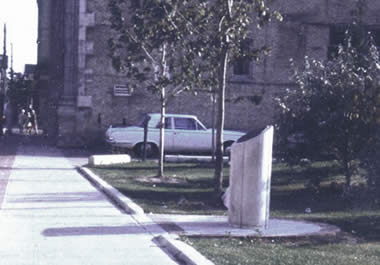 Those who lent their names to the sponsoring committee included His Eminence Emmett Cardinal Carter, Hillary Weston, later to become Lieutenant-Governor of Ontario; Mr. Roy Megarry, publisher of The Globe and Mail; Toronto Mayor Arthur Eggleton; Mr. Arthur Maloney, Q.C.; Lloyd Francis, then Deputy Speaker of the House of Commons; R. Roy McMurtry, Ontario Attorney General, and, of course, David Crombie. One name is missing, that of the originator. At the time he was hale and hearty. In later life he suffered debilitating illness and mental anguish when erratic behaviour, traceable to his medical condition, led to public excoriation and a painfully drawn out resignation from public life. His was a name unknown to me when he arrived at the office I occupied, introduced himself, and said he believed that Francis Collins deserved memorialization. If I agreed, he would form a committee to see it accomplished. In subsequent conversation it transpired that the Senator, for that was what he was, had been born in the very town in Ireland where I had spent most of my youth. Although in the Canadian Parliamentary Guide his birthplace was shown as Belfast, his mother had been visiting Rossnowlagh, a seaside resort in County Donegal, when she went into labour, and Andrew Ernest Joseph Thompson first saw the light of day in the Sheil Hospital, three miles distant, in the town of Ballyshannon. Like many remembered for wrong reasons, the good done by Senator Andrew Thompson during a long life of service to his adopted country, as social worker, member of the Ethnic Press Association of Ontario, refugee spokesman, and later in political life, rising to become Leader of the Liberal Party in the Ontario Legislature, has been forgotten. His action, and the subsequent "go like a bullet" commitment of the Honourable David Crombie, deserve lasting recognition by all who follow in the footsteps of Francis Collins, one-time foe and victim of the infamous Family Compact.
A trio of tall men, Vic Althouse, Les Benjamin, and Lorne Nystrom, all from the same prairie province, Saskatchewan, occupied seats in the House of Commons as members of the New Democratic Party during much of the 1970s and the early 1980s. Why tall men should have been such a physical presence in the party that played such a strong advocacy role for the lesser advantaged in Canadian society since it foundation in 1960 is for others to determine, but if that party has lacked numbers it has certainly not lacked big men. Tommy Douglas and Stephen Lewis senr, its leaders for many years, were not tall men, but that did not detract from the leadership roles they played in bringing universal health care into existence, and improving social services. And they led a united party, a crucial test for all political leaders. Les Benjamin was the first of the trio to be elected as representative for Regina West in the General Election of 1968. A railway man, he had served in the Canadian Armed Forces during WWW II, and had a westerner's innate ability to make friends with members in all parties. He was his party's transport critic, and spoke with the first-hand knowledge of a man who had worked with transport workers and knew the conditions they had to contend with in their daily lives. Les Benjamin was respected for his sincerity. Many mourned with him when he lost a daughter in a sky-diving accident. All regretted the illness against which he struggled during his last year in the House of Commons. That illness forced him to vacate the seat which he had retained through five elections. The Chamber was a less friendly place when he left it. Vic Althouse, Member for Humboldt-Lake Centre, was a farmer with a practical knowledge of agriculture in a number of its branches. Twelve years younger than his colleague, Benjamin, he had been Chairman of the National Farmers Union Grain and Oilseeds Commission, Secretary of the Saskatchwan Hog Marketing Commission, and a member of the Canadian Wheat Board Advisory Committee. He won election to the House of Commons in the General Election of 1980, and with his extensive experience was quickly appointed agriculture critic for the New Democratic Party. He took his task seriously. He spoke directly to the subject under discussion, clearly, articulately, and with understanding, and from a Hansard reporter's viewpoint was of the easiest Members to report. Destined to serve in Opposition without any realistic hope of ever achieving ministerial responsibility, Althouse persevered in the role for which he was ably suited, and by sheer earnestness and conviction made sure that western agriculture's importance to the national economy was impressed on public consciousness. Lorne Nystrom, once the youngest person to be elected a Member of Parliament in Canada, was the third of the tall men from Saskatchewan. He has proven to be the longest serving member of the trio. At the age of twenty-two he was first elected Member for Yorkton-Melville in 1968, and at the time of this writing in 2003 is still its representative in the Commons. Such longevity in public life on the federal scene was more common in years past. In recent times some Members decide to devote a set number of years to federal politics as part of their career experience. Nystrom represents those to whom politics is a lifelong vocation. During his time in the House, Lorne Nystrom has seen his party's fortunes bring mixed results, but whether returned at each election with more or fewer seats than in the preceding one, he has persevered. The fields in which he has been the official critic for the New Democratic Party reveal him to be a rival to Prime Minister Chrétien as a generalist, Youth, Finance, Agriculture, Constitution, Trade, Consumer Affairs, and others being assigned to his care during his more than thirty years in Parliament. Competence has been the hallmark of his service, to constituents, to party, to Parliament. The sharp edges of youth have given way to the roundness of experience. It has been from an almost avuncular Hansard perspective that his life as parliamentarian has been observed. He has given his constituents reason to be proud of their choice those many years ago, the same choice they have made election after election. Where did the appellation "three tall men" come from? It was at the unveiling of the statue on Parliament Hill of another prominent Saskatchewanite, former Prime Minister John George Diefenbaker. Walking back to the Centre Block happenstance threw me into their company. All at once I became aware that, although not lacking in height, I was overshadowed by all three. "Yes," laughed Althouse, "we grow them big out west." They certainly do. In his prime, Diefenbaker himself was not vertically challenged. Crouse was the leading expert in the House on the Atlantic fishery, at least from a practical standpoint. He could claim to have established not one but three fishing companies before entering politics, Crouse Fisheries Ltd., Viking Fisheries Ltd. and Atlas Fisheries Ltd. He also had served his country in wartime as a member of the Royal Canadian Air Force. Lloyd Crouse could talk about the fishery in all its aspects. He knew the risks, physical and financial, involved in manning and operating his own boats, and had particular expertise in the scallop fishery. I never met another man who could talk so knowledgeably about scallops. My own scant acquaintance with sea fishing was limited to jigging for cod on an afternoon fishing tour outside St. John's Harbour in Newfoundland, and a stomach tossing experience on a lobster fishing boat off the north shore of Prince Edward Island. Hence I could not keep up my side of the conversation until I happened to mention a film that had made a great impression on me many years previously, Captains Courageous, starring Spencer Tracey and Freddie Bartholomew. That opened up the floodgates. It turned out that it, also, was one of his favourite movies of all time, and seemingly that was enough to confer on me a status I never merited, that of someone who knew fishing. Quite apart from the fact that he paid particular attention to ensuring he was accurately reported in Hansard-something all the longer serving members had in common-Lloyd Crouse was one of the few who was a master of his subject. His service to his constituents, his party, and his country merited his elevation to Lieutenant-Governorship. At some stage in life he concluded that one way to get his message across to an audience was to put it in verse. This, he believed, would implant it in their consciousness. True, it was a device well known and well tested, even before biblical times. Its English language practitioners ran the gamut from Chaucer to the Scottish-born William Topaz McGonagall, almost unanimously recognized as the worst versifier of his or any other time. At the risk of giving offence, Gordon Tower's poetic effusions were closer in scale to those of McGonagall than of Chaucer. But they were his own, and rightly was he proud of them. He struggled to match them with contemporary events, and probably contributed more versification to the pages of Hansard than any other Member in recent times. They were not appreciated by Madam Sauvé who occupied the Speaker's Chair, and attempted to stem the weekly flow of verse coming from Red Deer's very own rider of the "wingéd horse". The somewhat prim and precise Dinsdale, who was a former Conservative Minister and had once been dubbed "the voice of God", and the rumpled, gravelly voiced Mackasey, Minister of Labour in the Trudeau Liberal government, were opposites in almost every way, political, ideological, and in background, who shared the only bond uniting such disparate characters-they had sought public office, had offered themselves to the scrutiny of their fellow Canadians, and had been found worthy to be returned to Parliament election after election. Dinsdale was the senior of the two, having been first elected in 1951 as the representative for Brandon-Souris, while Mackasey did not take his seat until 1962. As Minister for Northern Affairs and National Resources, to which portfolio he was appointed in 1960, he made a lasting reputation as promoter of the Roads to Resources program designed to open up the Canadian North to development of its vast mineral and other natural riches. He regaled many an audience with the story of how he came to be dubbed "the voice of God". Having been a veteran of the Royal Canadian Air Force in which he served from 1941 to 1945, and won the Distinguished Flying Cross while with the renowned Mosquito Night Fighter Squadron, he was one of the first to fly a light aircraft when visiting the outlying districts of his riding during an election campaign. The plane was fitted with a loudspeaker system which allowed him deliver a brief message as he flew over the countryside. A farm youngster, who
heard that message from
on high, went running
to his dad to tell him
God had just told them
to vote for Walter Dinsdale.
That Dinsdale always
gave the Salvation Army
as his religious affiliation
somehow gave credence
to the story. He championed the working person so earnestly and forcefully that, as Minister of Labour from 1968 to 1972, he was accused of being overly generous in seeking to provide expensive unemployment insurance benefits. As for his speaking voice, Dinsdale had cause for complaint. It was gravelly, a Wallace Beery kind of voice, with an occasional mixture of sand which tended to clog his vocal chords, lowering the sound to an almost inaudible pitch. For Hansard reporters in general it presented difficulties. Sometimes a slurred word did not become intelligible until a sentence had been completed, and then it had to be inserted, either going back several lines or making an out-of-place separate notation. Bryce Mackasey's career led in many directions. After holding a number of portfolios he made a surprise switch in 1976, resigning his seat in the federal Parliament to seek, and win, election to the Québec National Assembly. In 1980 he returned to the federal scene and served another four years as a Liberal M.P. Before leaving office
in 1984, Trudeau named
him Canadian Ambassador
to Portugual, an appointment
that was abruptly cancelled
by Brian Mulroney in
a highly unedifying
manner when he became
Prime Minister later
the same year. Walter Baker, in addition to his multitudinous duties as representative of both an urban and rural area, devoted himself to the task which required his attendance in the Chamber often for lengthy stretches of time. Late on Friday evenings, when all but he had departed on weekly trips home to their ridings, he was the lone member holding the fort, as it were, for his party in the Chamber of the Commons. He was respected by his opposite numbers in other parties, indeed by members in general. A frequent visitor to the Hansard offices, he became a genuine friend to the staff and appreciated the work they did. As a parliamentarian with a known record of service, his appointment to the Clark cabinet in 1979 was greeted with general approval, and he looked fair set to becoming one of its stronger ministers over the course of time. The abrupt termination of that Government, defeated on the notorious "short term pain for long term gain budget" introduced by the Minister of Finance, John C. Crosbie from Newfoundland, came as a resounding shock, not least to Walter Baker, who, because of his previous experience as House Leader, was blamed by some for not postponing the taking of the vital vote until the next day when sufficient numbers of PC members could be present to assure passage of the budget. In hindsight, there were others responsible for the blunder, but Baker, an honourable man, took upon himself more than his share, and it showed. In later months he lost his ebullience. Even later the crushing defeat still showed in his eyes. When illness struck he succumbed, and died at the early age of 53 in 1983. He is memorialized in his hometown, Ottawa, the nation's capital, by the Walter Baker Sportsplex, and is remembered with fondness by all who knew his tireless work on behalf of constituency and country.
One man whose friendship I valued during the years I spent on the Hill arrived there at the early age of twenty-eight years. He won his seat first in the General Election of 1979, and has held it ever since thanks to the electors in the Manitoba riding of Winnipeg-Birds Hill in Winnipeg, later renamed Winnipeg-Transcona. Bill Blaikie has a formidable physical presence and could easily be taken for an ex-lineman on the Winnipeg Blue Bombers professional football team. In actual fact he is a United Church Minister who has succeeded in melding his two callings, church and politics, with ease, something that few have ever accomplished in Canadian public life, at least in recent years. Stanley Knowles, long-time Member of Parliament for the riding of Winnipeg North-Centre, was one of them. Coincidentally, the New Democratic Party claimed their adherence. Over time Blaikie has proven himself to be one of the more eloquent speakers in the House. His sincerity has won him the respect of his peers, and in the inward functionings of the Commons he has played a leading role. His membership of the House's Special Committee on Parliamentary Reform in 1982, and later of the Internal Economy Committee, has given him an expertise in procedure and management not shared by the general body of members. No doubt due to coaching from his older colleague, Stanley Knowles, he came to be a frequent visitor to the Hansard offices, and it was there my personal respect for the man blossomed. Her knew of my Irish background, and revealed that he had Irish connections. It was during the worst years of the recent and, some may say ongoing troubles in what is known as Northern Ireland. He talked knowledgeably about places with the unionist tradition, and I about attending a school in Belfast associated with the nationalist tradition. We deeply regretted what was occurring in that sectarian ridden corner of the country, and learned we could converse freely without bias on events that we were mercifully far removed from, in distance and in spirit. In later years Blaikie has developed masterful skills during the daily Question Period. He is one of the few who eschew reading their questions from prepared texts, and due to quick thinking cuts through ministerial bafflegab to expose incompetence. Other clergy who entered the political arena without lasting success during my years with Hansard swim fleetingly through memory's eye. They include Dan Heap (Spadina), Roland de Corneille (Eglinton-Lawrence), Andy Hogan (Cape Breton-East Richmond), and Bob Ogle (Saskatoon East). The Honourable Alvin Hamilton, first elected in 1957 as Member for the riding of Qu'Appelle-Moose Mountain in Saskatchewan, was a tall, imposing figure, who commanded attention whenever he spoke either from the Government or Opposition side of the Commons. A navigator who attained the rank of Flight Lieutenant in the Royal Canadian Air Force in which he served from 1941 to 1945, he was a natural leader of men. In the Diefenbaker Government he preceded Walter Dinsdale in the Northern Affairs and Natural Resources portfolio, and made his reputation as Minister of Agriculture, which ministry he made his fiefdom from 1960 to 1963. Hamilton's speaking voice while serving in Opposition suffered as the result of a stroke which mildly affected one side of his face. As the years passed, Hansard reporters had difficulty catching the full intent of what he said, a key word or syllable having been inaudible, but he recognized the fact and always made himself available for later verification. There was one occasion when, in conversation, I threw in a reference to "single speech Hamilton". He was intrigued to learn that his namesake had been a British Member of Parliament to whom Edmund Burke once acted as secretary and who had gained his name due to the fact that he had spoken only once in Parliament. The same could not be said of his one-time secretary, Burke, and certainly not of Canadian Alvin Hamilton. Alvin Hamilton in later years was credited with nurturing the young Brian Mulroney who, as a university student, served on his election team and experienced at first hand how a successful election campaign should be run. It was a lesson Mulroney learned well, touring the small towns and gravel roads of rural Saskatchewan. In all, he won his seat in ten General Elections, and surprisingly lost it once halfway through his parliamentary life, that being in 1968. From then onwards until his last election in 1984 he was unbeatable. His greatest public success came when, as Minister of Agriculture, he signed the first major wheat deal between Canada and China in 1960. It was at a time when Canadian granaries were bursting with wheat, and its sale to China added much to the prosperity of Prairie grain farmers. When he retired from
the Commons, Alvin Hamilton
was one of the very,
very few to be granted
the privilege of maintaining
an office in the Centre
Block, which privilege
he valued greatly. There
he worked on his huge
collection of papers,
and there he was glad
to reminisce on events,
great and small, with
those who visited him.
At the time of which he wrote, Margaret Thatcher was the Prime Minister of Great Britain, and Jean Wadds was Canada's High Commissioner in London. Personally I have every reason in the world to be glad that Trudeau chose to retain Jean Wadds as High Commissioner. A Tory, she had been appointed by Joe Clark to the post, and might well have been replaced by Trudeau on his return to power. Also at the time of which he wrote I was an associate editor on the Hansard staff in Ottawa unaware that Jean Casselman Wadds was to play a part in my own life. It was as Jean Casselman, the Honourable Member for Grenville-Dundas for ten years from 1958 to 1968, that she was known to us. Her husband, Azra, had held a seat in the House of Commons from 1921 to 1958 and, as was the custom in those days, his widow was chosen as a safe candidate to take his place following his death. That she held the seat for ten more years was evidence that she had earned it in her own right. She had no enemies. She performed capably. And following her defeat, married a gentleman named Wadds. End of story. Not quite. When Clark became PM he plucked her out of retirement and made her Canada's top representative to the Court of St. James. To celebrate the Ottawa Hansard's centennial, a book, The Hansard Chronicles, was published in 1980, which made its way into parliamentary libraries around the globe. Because it traced the history of parliamentary reporting to the days of William Cobbett and Thomas Curson Hansard in Britain, of Maret in France, and was written by a naturalised Canadian, Mrs. Wadds presented copies to the Speaker of the Westminster House of Commons, and to the Queen's personal library. Back in Canada "The Globe and Mail" made much of these events. To Mr. Trudeau's praise of Mrs. Wadds I add my own humble thanks. Not everyone has a book in the Queen's private library. Sometimes members who come unsummoned to memory's eye are there but briefly, seen in frozen instants of time. One is a member vehemently arguing that he did not say what he said and was reported as saying, that he had checked with colleagues who listened to him and they agreed with him that he did not say it, only to walk silently away when a replayed recording verified the reporter's transcribed note, throwing his spoken words back in his teeth. Another is a member who wheedled and cajoled in an attempt to see another member's "blues" when that was strictly forbidden, and who solemnly contrived at connivance-"Just slide the typescript across your desk, go into the outer office for a minute, and you won't know what went on while you are gone!" It was a smarmy performance. I had more respect for the bald-faced fibber. Fortunately such instances were rare, and somehow those involved never stayed the course, losing their seats in subsequent General Elections. Members knew that when they attempted to mend their hand, adding to or subtracting from their reported words, they ran the risk of exposure before their peers. They suffered admonition from the Speaker and, worse still, brought the institution itself into disrepute, losing the trust of their colleagues in the process. Overall the conduct of members was admirably straightforward. They had run the gauntlet of public opinion in election after election. They earned the trust of their electors. They conducted themselves responsibly. As men and women in public life they were a credit to their country, to the Canada they sought to serve as best they could. That some caused scandal, resigned in disgrace, or were shunted off into the outer darkness of the Senate or other patronage ridden organizations, cannot be gainsaid. The others, the truly honourable Members of Parliament, deserve the thanks of all Canadians. It was my privilege, and that of my colleagues on Hansard, to have served them to the best of our abilities in our way, in their and our times. They shall live on in memory's eye and in the remembrance of their country in histories yet unwritten. If I have managed to give them a human face in these pages I will consider the effort has been well worthwhile, even more so if readers, including students of all ages, are encouraged to undertake research into the lives of all Canadian men and women parliamentarians as they played out their roles "on the Hill", in the Chamber, corridors, old Reading Room, offices, and all the nooks and crannies of the House of Commons in Ottawa.
Joseph-Jacques Jean Chrétien was the least likely entrant to membership in the House of Commons to become Prime Minister of Canada. Anyone who remembers his first attempt to address the House in English, let alone his mother tongue French, would have been clairvoyant beyond belief. Fresh faced, gangly, youthful, with a speech impediment that Hansard and Press Gallery reporters alike found difficulty interpreting, he seemed destined to become nothing more than another backbencher, the best he could hope for being a fill-in Parliamentary Secretary in a junior portfolio. Surprisingly, he was plucked from obscurity by Pierre Trudeau who appointed him as his Parliamentary Secretary in 1965, and six months later passed him on to Mitchell Sharp, the Minister of Finance, to act as his Parliamentary Secretary. Sharp took the awkward young man under his care, and over time turned him into a remarkable malleable politician worthy of ministerial rank. As Liberal government succeeded Liberal government, Chrétien successfully became Minister of National Revenue, Minister of Indian Affairs and Northern Development, President of the Treasury Board, Minister of Industry, Trade and Commerce, Minister of Finance, Minister of Justice and Attorney General and Minister of State for Social Development (three posts all at once), Minister of Energy, Mines and Resources, and lastly Deputy Prime Minister and Secretary of State for External Affairs, an impressive resumé covering the nineteen years between 1965 and 1984, truly the embodiment of Shakespeare's' "one man in his time plays many parts". In all Chrétien wore the mask of twelve different departments, but underneath each mask the face remained the same, and his political ambitions flamed higher and higher. Through sheer longevity and personal smarts he in turn fostered other newcomers, building a base of power and influence strong enough to carry him to second place on the ballot to replace Pierre Trudeau at the Liberal Party convention where John Turner emerged winner. It was the best thing that could have happened to Chrétien at that stage of his political career. It was left to Turner to be trampled under the Mulroney juggernaut, and after a spell serving as External Affairs Opposition critic, Chrétien resigned from Parliament to seek lucrative employment in the private sector. His return to Parliament coincided with the Mulroney Tories' implosion. Chrétien's Liberals won majorities in three successive elections, and during his eleven years as Prime Minister the one-time self-styled "little guy from Shawinigan" appointed a total of 77 members of the Senate of Canada, a modern-day record. Writing solely from the perspective of a Hansard annalist, Jean Chrétien deserves respect for the tenacity he displayed in his early days in Parliament when he persisted in speaking English until he achieved some measure of fluency in that language. One of the worst examples of downright bad manners that I recall was the mimicry of his speaking habits by an Ontario Tory member who garnered a few cheap laughs from his colleagues. That member has long since faded away, and the last laugh is surely deserved by Chrétien. An example of Chrétien's own wit was the occasion when he found himself with one of his staffers at a Christmas party. The staffer had brought his father along with him, and introduced his Dad to Chrétien, who insisted that the three of them be photographed together, and promptly dubbed the picture, "Father, Son, and Holy Ghost". Chretien's ghost will continue to haunt Parliament for many, many years after his retirement. A pleasant man, low-keyed in tone and voice, he was diligent, hard-working, eager to learn, and had the ability to carry with him throughout his term as Speaker the respect and good wishes of members in all parties. When he left office a special position was created for him, Canadian minister at large for the Environment, for which his earlier experience had well qualified him. Hansard staff found him easy to report, and he took a keen interest in the progress made in introducing electronic reporting which could provide closed captioning of the televised proceedings of the House. Unfortunately it was claimed there was no French method easily adaptable to the same task, and it fell his lot to acquiesce in the disbandment of the English Hansard staff and its amalgamation with its French counterpart, cutting off employment opportunities for English reporters who, at the time, were recruited from all the English-speaking provinces. Now debates are recorded, as distinct from reported, on tape. This brings this portion of memoirs centred on Speakers of the Canadian House of Commons to a close. The nine Speakers mentioned were those who spanned the years I spent observing and reporting them in the Parliament of Canada. All executed their duty as they sought fit, with results and consequences, good and bad, for the House of Commons, its traditions, powers, and failings. They contended with over-flowing egos, and with an official structure to which at times they yielded, barely retaining their own independence of thought and action. It was a maxim that new Speakers had two weeks in which to show their mettle before floundering under a tidal wave of officialdom. Some kept their footing. Some made their mark. Some became part of the scheme of things. It is little wonder that individuals elected to the position still make a show of reluctance to take the Chair, knowing the rewards but wary of the pitfalls. A good Speaker, a strong Speaker, is a pearl without price in a parliamentary setting. Others are mere paste. The Senate is the second constituent element of the Parliament of Canada. Its membership is non-elected, having been selected and nominated by the Prime Minister of the day. As such it is a total negation of democracy, devoid of franchised legitimacy, and demeaning to Canada. It is a festering sore on the body politic. No Prime Minister has ever been willing to lance it. It has never figured as the central issue in any Canadian election. Canadians have never had a chance to express their opinion of it in a referendum. Do Canadians want only one man to continue to have the unfettered power to appoint persons to the Senate? To ask is to answer. There are three constituent parts of Parliament. Everyone knows the first two, Commons and Senate, but time after time aspiring candidates for jobs on Hansard failed to name the third, which is the Monarch, pro tem. In the case of the eight Prime Ministers who held office during my service with the House of Commons the monarch was one solitary figure, Queen Elizabeth II, whose accession to the Throne took place in 1952 and which Throne she has occupied ever since. One of her duties whenever she is in Canada, and during her visit Parliament is called into session, is to read the Speech from the Throne. This she does in the Chamber of the Senate in front of assembled Honourable Senators, robed Justices of the Supreme Court, Ambassadors of foreign countries, and an assorted motley of common Members of Parliament. This she does, speaking both official languages. This she does with practice and ease. When she is not in Canada, a Speech from the Throne is normally read by the Governor General pro tem. Elizabeth II in the course of her long life has seen Prime Ministers, members of the Judiciary, many, many Ambassadors, and thousands of elected Members of Parliament and appointed Senators come and go, however long tenured they may have enjoyed elected or appointed office. Throne Speeches are well circulated in advance, obviating the need for Commons Hansard reporters to be present. Our presence was rightly restricted to that of observers. One memorable occasion was her entry into the Commons foyer, regally gowned, tiara firmly in place, to attend a dinner hosted by then Prime Minister Pierre Trudeau. For a moment I came to understand the passion, the curiosity, the patience of those countless thousands of her subjects who lined the streets in Ottawa and other Canadian centres hoping for a momentary glimpse of the Queen and, if lucky, became the recipients of a smile or trademark hand wave. In her person she manifested a royal presence. The question of what is to become of the Monarchy in the ongoing story of Canada may soon come to a head. Soon is a relative term, but the question will demand an answer. That answer can be most democratically answered in a referendum. What is there to fear in asking Canadians what they wish? The Queen is a decent person. Will she be followed by a jackinape, a common pot walloper, a Defender of the Faith, or a worthy Canadian Head of State chosen by the free will and free votes of citizens who themselves, or their children, can aspire to that position by virtue of competence and integrity, and not by happenstance of birth? Again to ask is to answer. The history of Hansard as a parliamentary institution was the subject of an exhibition held in the House of Commons in April 1980, and of a book written to celebrate its Canadian centennial, "The Hansard Chronicles". "In Memory's Eye" contains numerous references to interaction between Members of Parliament and the people who staffed Hansard in the Canadian House of Commons during the thirty-five years that its author worked there between 1960 and 1994. Hansard reporters during that time were vital cogs in the machinery of Parliament. Highly skilled shorthand writers and stenotype operators, they devoted their talents to capturing the spoken words of politicians in all parties representing all regions of Canada, in debates the outcome of which was the formulation of the laws of the land. They took their work seriously. Some careers spanned over forty years. Seated at desks in the centre of the Chamber of the House of Commons they became part of the furniture, a fixture seen but not noticed by those they served. They became familiar with the speaking styles, nuances, cadences, favourite expressions of those Members who participated frequently in the proceedings, and when required made them conform to necessary grammatical changes. There were two branches, English and French, staffed by specialists in their own language. Perforce this book deals with memories from the English side of Hansard. The French side awaits its own telling. The English reporters and editors on staff at the time of the centennial celebration in 1980 were Jack Dyer, Ita Straszak, Doug Baker, Brenda Morrison, Peter Parsons, Charles Fisher, Ron Tremaine, Brian Potvin, James McCrae, Les Lusk, Una Allen, John Ward. As attrition took place, a new generation of stenotype-machine shorthand reporters, capable of providing closed captioning to the televised proceedings of the House, joined the staff. They included Ron Curry, Diane Halvorsen, Lillian Purdy, Nancy Campbell, Bruce Hubbard, Joan Henderson and John Waddell. Regrettably their careers as Hansard reporters were abruptly terminated when tape recording replaced them. Fortunately all the people of Hansard are honoured by a memorial plaque which hangs in the foyer of the House of Commons. Finally, the reproduction below shows the House of Commons in session in 1964, when Pearson was Prime Minister and Diefenbaker was Leader of the Opposition. Halfway between them sits the Hansard reporter who just happens to be the author of In Memory's Eye forty years later. 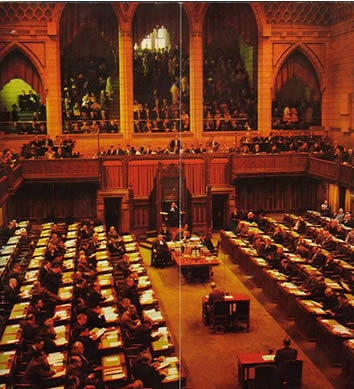 Historic Photographs The first is reproduced, with grateful acknowledgement, from the Ottawa Citizen, showing how an explosive device thrown into the Commons Chamber in 1966 bombing incident could have wreacked havoc. 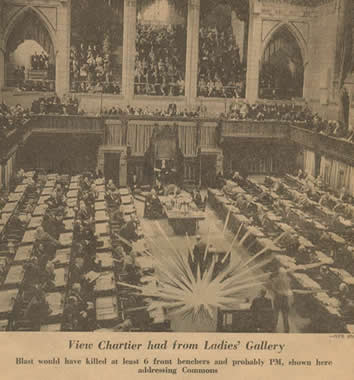
The second shows the Hansard centennial plaque which hangs in the foyer of the Parliament Buildings. 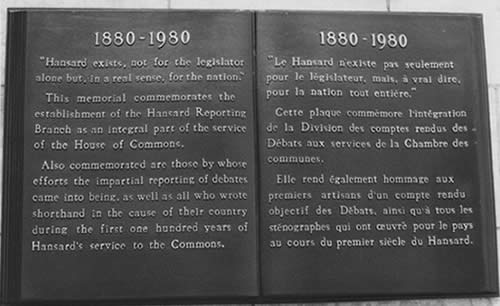 The third, with grateful acknowledgement to Maclean's Magazine, shows the Commons Chamber during the seventeen days "ringing of the bells" . A Table Clerk, a member of the Handard staff, and a member of the Protective Service remained on rotational duty day and night throughout the entire period. 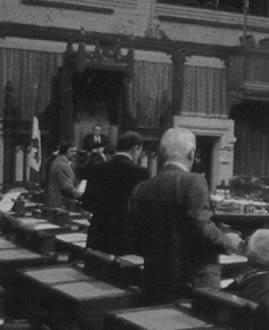 Acknowledgements I wish to express thanks to the House of Commons for permission to reproduce the photographs of Members from its web site, to Rynn Solutions of Ottawa, for their expertise in web design and maintenance, to Nigel Knight, Ottawa, for his photographic reproduction work, and to "Auntie Grace's" niece Betty, my wife and helpmate, for her support throughout my years of service with Canada's Parliament and ever since. John Ward The End
Home | About | Canadian Vindicator | Literature | Gallery | History
|
|||||||||||||||||||||||||||||||||||||||||||||||||||||||||||||||||||||||||||||||||||||||
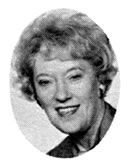 "Flora". That. Only that. Seldom is it given to one person to have but one name. Mary Queen of Scots. Elizabeth of England. Joan of Arc. They all carried their own special designation. But Flora? Flora of Canada? Flora of Kingston? The very thought is ridiculous.
"Flora". That. Only that. Seldom is it given to one person to have but one name. Mary Queen of Scots. Elizabeth of England. Joan of Arc. They all carried their own special designation. But Flora? Flora of Canada? Flora of Kingston? The very thought is ridiculous.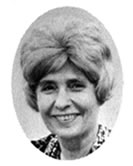 "Auntie Grace". That was always how she was known to the people of Hansard. To the people of British Columbia, indeed to Canadians everywhere, she was both the loneliest and the most revered woman in Parliament.
"Auntie Grace". That was always how she was known to the people of Hansard. To the people of British Columbia, indeed to Canadians everywhere, she was both the loneliest and the most revered woman in Parliament.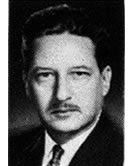 Westminster has a much longer history of sex scandals than Parliament Hill, but uniting the English and Canadian Parliaments was a credo of silence, especially in the early post World War II era. Each in its own way was a hotbed of gossip, rumour, and speculation where such affairs were concerned, but there existed an unspoken understanding that private lives were not fair game for "the gentlemen of the Press" at a time when that was what they were called.
Westminster has a much longer history of sex scandals than Parliament Hill, but uniting the English and Canadian Parliaments was a credo of silence, especially in the early post World War II era. Each in its own way was a hotbed of gossip, rumour, and speculation where such affairs were concerned, but there existed an unspoken understanding that private lives were not fair game for "the gentlemen of the Press" at a time when that was what they were called.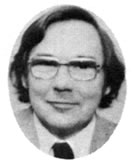 The Chamber was empty. Members had gone to lunch. Nobody was in the galleries. Yet there was a voice faintly heard outside the locked doors.
The Chamber was empty. Members had gone to lunch. Nobody was in the galleries. Yet there was a voice faintly heard outside the locked doors.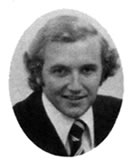 "There are very few saints on Parliament Hill" was a famous remark uttered by long-time Liberal strategist Alan MacEachen, wily Member of Parliament from Cape Breton, credited with returning Prime Minister Trudeau to power after the nine-month interregnum created by the Clark administration in 1981.
"There are very few saints on Parliament Hill" was a famous remark uttered by long-time Liberal strategist Alan MacEachen, wily Member of Parliament from Cape Breton, credited with returning Prime Minister Trudeau to power after the nine-month interregnum created by the Clark administration in 1981.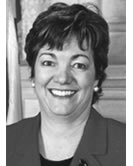
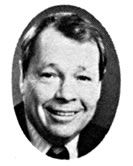 "Tell me what you want me to do and I'll go like a bullet!" To say I was bowled over by that statement would be an understatement. This had been one of the most prominent Ministers in government and he was offering his help unreservedly, without hesitation, in forwarding a project which he had just learned about minutes previously.
"Tell me what you want me to do and I'll go like a bullet!" To say I was bowled over by that statement would be an understatement. This had been one of the most prominent Ministers in government and he was offering his help unreservedly, without hesitation, in forwarding a project which he had just learned about minutes previously.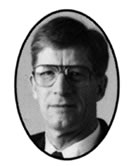
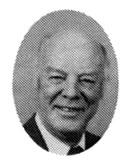
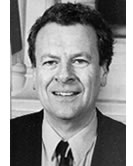
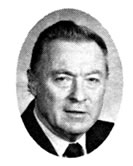 Nova Scotia had one of the longer serving members in the person of Lloyd Crouse during the period covered by these memories. He was first elected as the Member for South Shore in 1957 and retained his seat during the next ten General Elections, ending his lengthy career in public life by being appointed Lieutenant Governor of his native province.
Nova Scotia had one of the longer serving members in the person of Lloyd Crouse during the period covered by these memories. He was first elected as the Member for South Shore in 1957 and retained his seat during the next ten General Elections, ending his lengthy career in public life by being appointed Lieutenant Governor of his native province.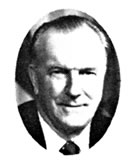 Another
Member of Parliament
who ended up as Lieutenant
Governor of his province
was Gordon Towers, who
represented the riding
of Red Deer in Alberta.
He was a farmer who
rhymed, or a rhymer
who farmed. Sometimes
it was difficult to
distinguish one from
the other.
Another
Member of Parliament
who ended up as Lieutenant
Governor of his province
was Gordon Towers, who
represented the riding
of Red Deer in Alberta.
He was a farmer who
rhymed, or a rhymer
who farmed. Sometimes
it was difficult to
distinguish one from
the other.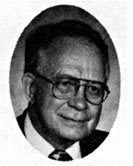 "I've
listened to that man
ever since he came here,
and I've never understood
a word he's spoken."
A harsh judgment? In
a way, but reflective
of both parties, the
Hon Walter Dinsdale
who uttered the words
to his seatmate, and
the Hon. Bryce Mackasey
who was addressing the
House.
"I've
listened to that man
ever since he came here,
and I've never understood
a word he's spoken."
A harsh judgment? In
a way, but reflective
of both parties, the
Hon Walter Dinsdale
who uttered the words
to his seatmate, and
the Hon. Bryce Mackasey
who was addressing the
House.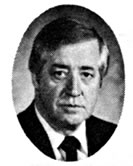 Bryce
Mackasey was cut from
different cloth. A stereotypical
Irish-Canadian born
in Québec City,
he was a people person,
a mixer, with a gift
for ingratiating himself
with whatever company
he found himself in,
even though they might
initially be reluctant
to admit him.
Bryce
Mackasey was cut from
different cloth. A stereotypical
Irish-Canadian born
in Québec City,
he was a people person,
a mixer, with a gift
for ingratiating himself
with whatever company
he found himself in,
even though they might
initially be reluctant
to admit him.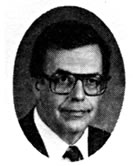 Politics
can exert a toll even
on the most robust frame.
A prime example was
the Honourable Walter
Baker, Member for Nepean-Carleton
and Minister for National
Revenue in the nine-months
long Progressive Conservative
Government in 1979.
A big, bluff, genial
man, he first entered
the House of Commons
in 1972, and as House
Leader for his party
put in long hours on
what most House Leaders
of all parties regard
as a thankless task.
Being a resident of
the National Capital
area, living less than
half an hour from Parliament
Hill, made him a natural
choice for the post.
It was assumed he could
devote more time to
the job than someone
representing a far away
constituency in the
Maritimes, Prairies,
or on the Pacific Coast.
Politics
can exert a toll even
on the most robust frame.
A prime example was
the Honourable Walter
Baker, Member for Nepean-Carleton
and Minister for National
Revenue in the nine-months
long Progressive Conservative
Government in 1979.
A big, bluff, genial
man, he first entered
the House of Commons
in 1972, and as House
Leader for his party
put in long hours on
what most House Leaders
of all parties regard
as a thankless task.
Being a resident of
the National Capital
area, living less than
half an hour from Parliament
Hill, made him a natural
choice for the post.
It was assumed he could
devote more time to
the job than someone
representing a far away
constituency in the
Maritimes, Prairies,
or on the Pacific Coast.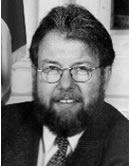
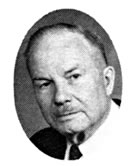 One
Member who had long
service in the House
of Commons was a notable
figure in an earlier
and longer lasting Progressive
Conservative Government.
As related elsewhere
in the section of this
book dealing with Canadian
Prime Ministers, I became
aware of the gentleman's
existence through the
pages of The Times of
London which I read
aboard the flight taking
me from Ireland to Canada
in 1960.
One
Member who had long
service in the House
of Commons was a notable
figure in an earlier
and longer lasting Progressive
Conservative Government.
As related elsewhere
in the section of this
book dealing with Canadian
Prime Ministers, I became
aware of the gentleman's
existence through the
pages of The Times of
London which I read
aboard the flight taking
me from Ireland to Canada
in 1960.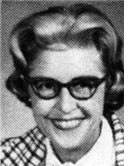 "I
always say it that it
was thanks to three
women that we were eventually
able to reform our constitution-the
Queen, who was favourable,
Margaret Thatcher, who
undertook to do everything
that our Parliament
asked of her, and Jean
Wadds, who represented
the interests of Canada
so well in London."
(P. E. Trudeau, Memoirs
p.311, McClelland &
Stewart Inc., Toronto,
1993)
"I
always say it that it
was thanks to three
women that we were eventually
able to reform our constitution-the
Queen, who was favourable,
Margaret Thatcher, who
undertook to do everything
that our Parliament
asked of her, and Jean
Wadds, who represented
the interests of Canada
so well in London."
(P. E. Trudeau, Memoirs
p.311, McClelland &
Stewart Inc., Toronto,
1993)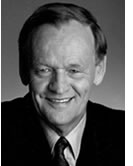
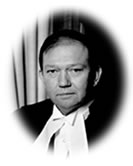 Next
to be elected Speaker
was the Honourable John
Allen Fraser, who took
over that position on
October 1 1986, and
who was the Member for
Vancouver South. He
had previously held
a number of ministerial
portfolios, one being
Minister for the Environment.
Next
to be elected Speaker
was the Honourable John
Allen Fraser, who took
over that position on
October 1 1986, and
who was the Member for
Vancouver South. He
had previously held
a number of ministerial
portfolios, one being
Minister for the Environment.